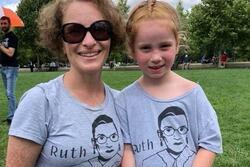Domestic Violence Awareness Month and Shalom Bayit
For too long some Jews have held onto the belief that abuse “just doesn’t happen” in the Jewish community. We, as Jews, are “better than that.” Nice Jewish boys don’t abuse anyone. But unfortunately, many of us know that this simply isn’t the case. Abuse in Jewish households occurs at the same rate as in secular ones—approximately 15–25 percent. This is true across denominations and income levels.
In the Book of Women, the Jewish scholar Maimonides wrote, “The Sages commanded that a man should honor his wife more than he honors himself, and love her as he loves himself … He should not intimidate her too much; he should speak with her gently, and should be neither saddened nor angry” (Sefer Nashim 15:19). Aside from being deeply problematic, patriarchal, and heteronormative, this excerpt, and quotes like it, are used to reinforce the myth that because abuse isn’t a Jewish value, it doesn’t happen in Jewish communities. Such a harmful narrative allows abuse to flourish.
In recent decades, however, a concept known as shalom bayit, peace in the home, has been reclaimed by Jewish feminists to end violence against women in Jewish communities. So what shalom bayit? In my last piece for Jewish Women, Amplified, I explained that the phrase means “peace in the home,” harmony, coexistence. Shalom bayit is an ancient Jewish value, with references to the principle dating back to Talmudic times. But, in the modern era, shalom bayithas been weaponized to end intimate partner violence in Jewish communities. We have some badass, powerful women to thank for this reclamation of this ancient term.
One of those women is Hanna Weinberg. Called the Harriet Tubman of the Jewish anti-violence movement, she sheltered victims of domestic violence in her home. Weinberg used her position as a rebbetzin to aid women and their children in escaping abuse and to consult rabbis across the country on the issue of abuse in Jewish households.
Weinberg worked tirelessly to create networks of volunteers, friends, and families to mobilize around victims and support them medically, financially, and emotionally. She was involved with the Center for the Prevention of Sexual and Domestic Violence as an advisor on the Orthodox Jewish approach to domestic violence, and consulted on the formation of CHANA (Counseling Helpline and Aid Network for Abused Women).
Weinberg is not the only person we have to thank for fighting to end domestic violence in Jewish communities. Many Jewish organizations also carry out this important work using the principle of shalom bayit to guide them. Among these is Jewish Women International. Since 1897, JWI has been at the forefront of the fight to ensure the physical, economic, and emotional safety of women and girls fleeing from abusive situations. Another organization, JCAD, the Jewish Coalition Against Domestic Abuse, takes a holistic approach to ending domestic violence and dating abuse by integrating clinical support with community education and prevention.
This Domestic Violence Awareness Month, let’s remember that Jewish communities are not exempt from intimate partner violence. Abuse does occur in Jewish spaces and Jewish homes. Preventing it, and ensuring shalom bayit, is imperative for women and for our whole community.








I’ve dealt with enduring domestic abuse in my life with a lot of religions examined. I come from a family that left the Orthodox in the 1900’s and never would consider Reform Judaism over Theosophical Atheism founding pioneer Mormons who became New Agers, studied under a San Franciscan Rabbi who stressed Elohisms I later studied in depth on a Christian Science/Burning Man commune as I did work for the Democratic and Republican parties in Arlington Texas and connected with the more feminist end of Mormon Relief Society roots. In my early 20’s, despite my upbringing as an open Ashkenazi CryptoJew in the American Branch of Soren Kierkegaard’s state church he took issue with which now has a deeply feminist and anti racist charter, I married a Landmarker Baptist when I was accustomed to NeoQuakerCharismatic worship styles that worked at Messianic Outreach.
My ex, also a CryptoJew of the Sephardic tradition who grew up in a still segregated Landmarker Baptist tradition had a much different spin on Kabbalah and Sotah and Sanhedrin than I ever encountered. Especially for a CHRISTIAN. I later found out in Masonic study these things are very Prince Hall Mason for a lot of Black Baptists of this tradition. My recent studies with other women of Augustinian/Constantinian Christianity (Catholic and Protestant) and Restorationist Christianity (Stress Elohistic worship) note the following: If Deborah Judged, Miriam Sang and Jael killed Cisera before Babylonian Exile and the rules changed dramatically after it, perhaps men worshipping all the Ba’alim in all of the Ziggurats was a huge issue. There is also noting that Leviticus institutionalized rape in conquest where Egyptian laws forbid it and allow women to be property owners rather than coding them as tradeable chattel. I think Judiaism has a lot to recommend it in ritual purity states and dietary law (if you are going to be a meat eater). But it’s important to realize that reform away from laws that institutionalize rape pervade all religions that stem from Judaism as a root, including active American law — which often does not have the structures in place to prosecute (Israeli law currently has clear sentencing for and prosecutes rapes except those still institutionalized in child rapes and trafficking rings. It’s complicated. But it’s all worth noting as a theological question. In the Americas 19th century Masonic Elohisms won many rights for women Theosophist secularist ones could not.
Thank you for this interesting blog - the Rebbetzin was indeed a formidable figure in the Jewish dv movement. I was struck however by the analysis of the text in the Talmud- I read it differently - as an acknowledgment that abuse did happen, and that Maimonides is teaching men (who will be the ones reading and learning the text) how to treat their wives - not to yell, not to intimidate, not to get angry. So rather than reinforcing a myth, this text acknowledges and tries to rectify the way Jewish husbands were treating their wives.
I'm also curious about why the writer says that the text is used to perpetuate a myth that 'abuse isn't a Jewish value..." In all my years of work on this issue, i have never come across a community or culture where the value itself is abuse - rather abuse is the result of other values - such as obedience, patriarchy, privilege for example - but abuse itself would not be the value that is espoused.